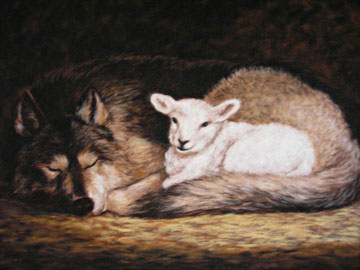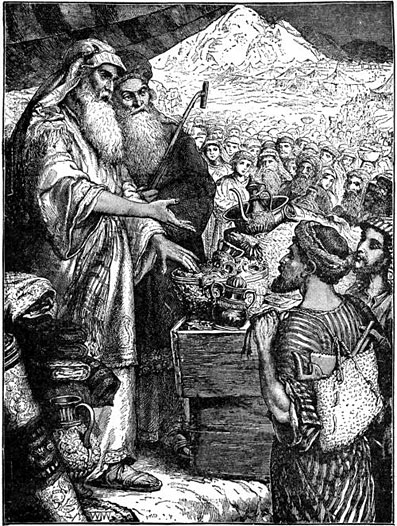Jul
3
2009
“Be meticulous to present yourself for the praise of God as an unashamed workman, cutting the word of truth in a straight line.” (II Timothy 2:15)
Is this verse simply teaching that if we “divide up” the Scriptures correctly, we’ll get an AWANA[1] merit badge from God? Hardly. It is flanked by condemnations of those who fight over the Scriptures to no profit, and those whose vain babblings are gangrenous.
Paul speaks of a soldier and a farmer, and then a productive workman. Paul is concerned about building saints and churches, and they are built by a straight and true cutting of the word. Like most of Paul’s statements, there is a very long, fully-loaded freight train of Old Testament history and typology right behind it, and it’s coming right at you, right now.
Continue reading
Comments Off | tags: Darius, David, Esther, Ezekiel's Temple, Nebuchadnezzar, New Jerusalem, oikoumene, Peter, Peter Leithart, Postmillennialism, Revelation, Solomon, Stigmata, Temple, Totus Christus, Worship | posted in Biblical Theology, Christian Life, The Last Days, The Restoration Era
Jul
2
2009
or Suffering as the Most Holy Place

I remember an atheist quoting one of David’s Psalms to prove that God doesn’t answer prayer. It was a song of despair. Despite such selective quoting, how do we deal with Bible passages that end without hope?
Continue reading
1 comment | tags: David, Despair, Jeremiah, Jonah, Lamentations, Michael O'Brien, Psalms | posted in Biblical Theology, The Restoration Era
Jun
12
2009

Isaiah’s visions of Israel’s restoration have nothing to do with a future millennial golden age for the Jews, or even directly with the first century, except by the events of the Restoration era prefiguring later history. His words were for his hearers, for both their condemnation and their hope in the near future. Why do we get him wrong?
Continue reading
3 comments | tags: David, Isaiah, Millennium, Mordecai, Noah, Restoration, The flood, Zerubbabel | posted in Biblical Theology, The Last Days, The Restoration Era, Totus Christus
Jun
7
2009
A couple of brave readers of my book Totus Christus have pointed out an apparent discrepancy in my ordering of the above three roles. One kindly writes:
The only question of substance I have for you concerns the prophet, priest and king flow of OT history. It may be that you disagree with Jim, but he’s quite insistent that the proper order is priest, king, prophet. He discusses this in From Bread to Wine, p. 9-15. In any case, it might be helpful to explain why you deviate…
Continue reading
Comments Off | tags: Aaron, David, Dominion Theology, High Priest, James Jordan, Moses, Music, Solomon | posted in Biblical Theology, Totus Christus
May
22
2009
And I looked, and behold, in the midst of the throne and of the four living creatures, and in the midst of the elders, stood a Lamb as though it had been slain, having seven horns and seven eyes, which are the seven Spirits of God sent out into all the Land. (Revelation 5:6)
The Bible is the story of the historic battle between the serpent-king and the servant king. Both sit on bloody thrones. Herod slaughters the innocents, and is then slaughtered by God. The innocent Christ is slaughtered, then sends His followers into the world as seven Spirits (Lampstand/Pentecost), but also as lambs among wolves.
Continue reading
2 comments | tags: Communion, David, Holy war, Lampstand, New Jerusalem, Revelation, serpent | posted in Biblical Theology, Christian Life, The Last Days
May
20
2009
The Purpose of the Restoration Covenant
“The restoration period is the last era of Israel’s history as the people of God and the climactic period of old covenant. The kingdom of God has grown beyond Israel and spread to the nations, who are the God-appointed protectors of His priestly people. Israel’s loss of independence and submission to Gentile powers was not a backward movement in the kingdom program of God. Abraham had been chosen by God so that through him all the nations of the world could be blessed (Gen. 12:3). In the restoration era, this was fulfilled more than at any other time in Israel’s history. Through the dispersion Jews had spread all over the world and they brought with them the knowledge of the true God.
Continue reading
Comments Off | tags: Babylon, Covenant Theology, Daniel, David, Ezekiel's Temple, Nathan, Persia, Restoration, Temple | posted in Biblical Theology, Quotes, The Restoration Era
May
12
2009

“And in that day His feet will stand on the Mount of Olives, which faces Jerusalem on the east. And the Mount of Olives shall be split in two, from east to west, making a very large valley; Half of the mountain shall move toward the north and half of it toward the south.” Zechariah 14:4
Surprising as His ways are, the Lord always follows procedure. Like Ahasuerus in the book of Esther, anything that is done is done by decree. Although, in the case of Ahasuerus, he needed to consult his elders, whereas God only consults his maturing elders (like Abraham and David–and now the church) to bring us to greater maturity.
A decree is written in the Most Holy, the king’s garden court (head). The elders in the Holy Place respond with liturgy (body). And then they ride out into the world on the swiftest horses to incite a Holy War that divides the world to bring about a New Creation.
Continue reading
Comments Off | tags: AD70, Ahasuerus, David, Esther, Greek philosophy, Liturgy, Numbers 5, Remnant, Restoration, Solomon, Temple, Zechariah | posted in Biblical Theology, The Last Days, The Restoration Era
May
7
2009

The Nazirite Vow
(Article requested by Drew J.)
This vow in Numbers 6 follows the “inspection of jealousy” in Numbers 5. Mark Horne observed that, just as the woman in Numbers 5 was to be inspected for harlotry with her hair untamed, so the Nazirite (whether male or female) was not to cut his or her hair. A Nazirite is a human picture of the church as a warrior bride. Hair is glory. Hair is the cloud of angels (and now, saints) surrounding the throne of God.
“Therefore the woman ought to have a symbol of authority on her head, because of the angels.” (1 Cor. 11:10)
A woman is the glory of her man. A woman’s hair is a symbol of submission, but also a symbol of her own “cloud of angels” – her godly offspring (See Ezekiel 5 for the children of Israel symbolised as the prophet’s hair, Micah 1:16, Matthew 10:30 and also my comments on Nehemiah and his hair-pulling). In battle, a Nazirite was like a blazing torch (the Ark-chariot/Adam) and smoking firepot (the smoke clouds of the incense altar/Eve army), parting his enemies like the pillar of God.
The hair is her “crop”, the twelve stars around her head (Rev. 12), and the question constantly posed to Israel concerns her role as God’s mediatorial Land. Is her crop one of thorns and thistles, or is it godly grain? This is also the question in Numbers 5, and the Lord put Israel to this exact test after the idolatry with the golden calf. The “harlots” were slain with the Levitical sword.
Continue reading
3 comments | tags: Adam, David, James Jordan, John the Baptist, Judges, Nazirite, Numbers 5, Numbers 6, Obed, Paul, Revelation, Samson, Samuel, serpent, Showbread, Tabernacle, Uriah, Wisdom | posted in Against Hyperpreterism, Biblical Theology
Apr
15
2009
Witness or Worship?
“…the political task of Christians is to be the church rather than to transform the world”–Stanley Hauerwas, Resident Aliens.
This presents a false dichotomy. When Gideon and David were faithful, God went ahead of them and defeated their enemies. Would it be fair to assume that Hauerwas is just saying that political activism is getting the cart before the horse? If so, then I agree with him. When the church is faithful, the blessings of God transform the world around her.
Continue reading
Comments Off | tags: Aaron, Ark of the Covenant, David, Ezekiel, Gideon, Holy Place, James Jordan, Manna, Politics, Table of Showbread | posted in Biblical Theology, Ethics
Apr
10
2009
Solomon’s New Broom
Solomon continued David’s role as redeemer/blood avenger. Like Ham’s attack on Noah, and Absalom’s sin on the roof, Adonijah’s request for one of David’s concubines was recognised as a grasp for the throne. Joab was judged for his shedding of innocent blood, and although he grasped the horns of the altar, refuge was lawfully denied (Numbers 35:15-19).1
The last priest of the house of Eli, Abiathar, was exiled before the Ark was given a permanent house. Like Gideon’s bull, the guilty “died” on the old altar before a new one could be established.
Solomon’s judicial execution of his father’s enemies was not paranoid. It was “good death.” The Lord always builds His house out of the corpses and plunder of His enemies. As death precedes resurrection, so discipline must come before joy (Hebrews 12:11) and Solomon’s actions here demonstrated his great wisdom as a judge.
______
1 “Why grasp the horns of the altar when you’re a fugitive in the temple? How is it legitimate to touch the horns, when the altar as a whole is forbidden to all but the priests? The answer to the first is found in the premise of the second: The altar is holy, and communicates holiness to anyone who touches it (if they aren’t holy already). When a fugitive grasps the horns of the altar, he becomes sanctified and hence inviolable. If found guilty, he will be killed (like Joab) because of a sacrilege; but if he is innocent, he protects himself with a taboo of holiness.” Peter J. Leithart, Horns of the Altar, www.leithart.com
Comments Off | tags: Absalom, Adonijah, David, Ham, Justice, Noah, Peter Leithart, Solomon, Wisdom | posted in Biblical Theology, Ethics






























